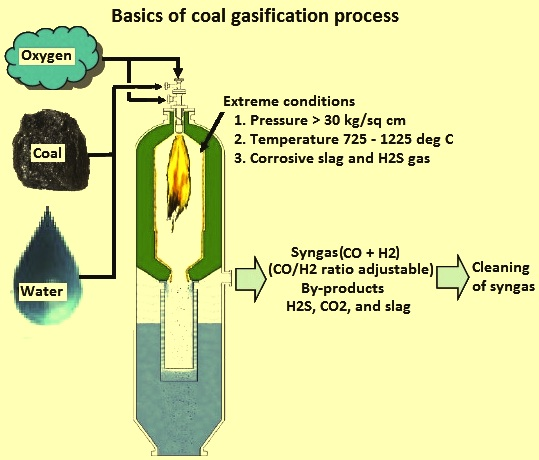Biodiversity & Environment
Promoting Coal Gasification in India
- 17 Jul 2023
- 5 min read
For Prelims: Promoting Coal Gasification in India, Coal Gasification, Goods and Services Tax, Input Tax Credit, Syngas, Natural Gas.
For Mains: Promoting Coal Gasification in India.
Why in News?
The Ministry of Coal is considering a Comprehensive Scheme to promote Coal Gasification, aiming to achieve 100 Million Tonne (MT) coal Gasification by FY 2030.
- The Ministry is also considering an incentive to reimburse the Goods and Services Tax (GST) compensation cess on coal utilized in gasification projects for a period of 10 years after the commercial operational date (COD), provided that the GST compensation cess is extended beyond FY27. This incentive aims to offset the inability of entities to claim Input Tax Credit for the same.
What are the Key Points of the Scheme?
- About:
- The initiative incorporates a comprehensive set of measures that capitalize on natural resources and demonstrate financial and technical feasibility of Coal Gasification.
- It aims to attract Government PSUs and the Private Sector, fostering innovation, investment, and sustainable development in the coal gasification sector.
- Process:
- The selection of entities for the coal/lignite gasification scheme will be carried out through a competitive and transparent bidding process.
- The government will provide budgetary support to eligible Government PSUs, and Private sector enabling them to undertake coal gasification projects.
- Significance:
- This initiative holds the potential to alleviate the environmental burden by reducing carbon emissions and fostering sustainable practices, contributing to our global commitments towards a greener future.
What is Coal Gasification?
- About:
- Coal gasification is a process in which coal is partially oxidized with air, oxygen, steam or carbon dioxide to form a fuel gas.
- This gas is then used instead of piped Natural Gas, methane and others for deriving energy.
- In-situ gasification of coal – or Underground Coal Gasification (UCG) – is the technique of converting coal into gas while it is still in the seam and then extracting it through wells.
- Production of Syngas:
- It produces Syngas which is a mixture consisting primarily of methane (CH4), carbon monoxide (CO), hydrogen (H2), carbon dioxide (CO2) and water vapour (H2O).
- Syngas can be used to produce a wide range of Fertilizers, Fuels, solvents and synthetic materials.
- Significance:
- Steel companies can reduce costs by replacing expensive imported coking coal with syngas from coal gasification plants in their manufacturing process.
- It is primarily used for electricity generation, for the production of chemical feedstocks.
- The hydrogen obtained from coal gasification can be used for various purposes such as making ammonia and powering a hydrogen economy.
- Concerns:
- The syngas process converts a relatively high-quality energy source (coal) to a lower quality state (gas) and consumes a lot of energy in doing so. Thus, the efficiency of conversion is also low.
What is the Need for Promoting Coal Gasification Projects in India?
- The adoption of gasification technology in India can revolutionize the coal sector, reducing reliance on imports of Natural Gas, Methanol, Ammonia and other essential products.
- Currently, India imports approximately 50% of its Natural Gas, over 90% of its total Methanol consumption and around 13-15% of its total ammonia consumption to cater to the domestic demand.
- It can contribute to India's vision of becoming Aatmanirbhar and create a surge in employment opportunities.
- The implementation of coal gasification is expected to make significant contributions to the nation's development by reducing imports by 2030.
Way Forward
- The government should conduct a comprehensive evaluation of the environmental, economic, and social implications of coal gasification projects.
- Continued investment in research and development can drive advancements in coal gasification technology, making it more efficient and environmentally friendly.
- Emphasize the development of a diversified energy mix that includes renewable energy sources, energy efficiency measures, and sustainable alternatives to coal-based energy production.
- Learn from global experiences and best practices in coal gasification and hydrogen economy implementation to ensure sustainable development.





